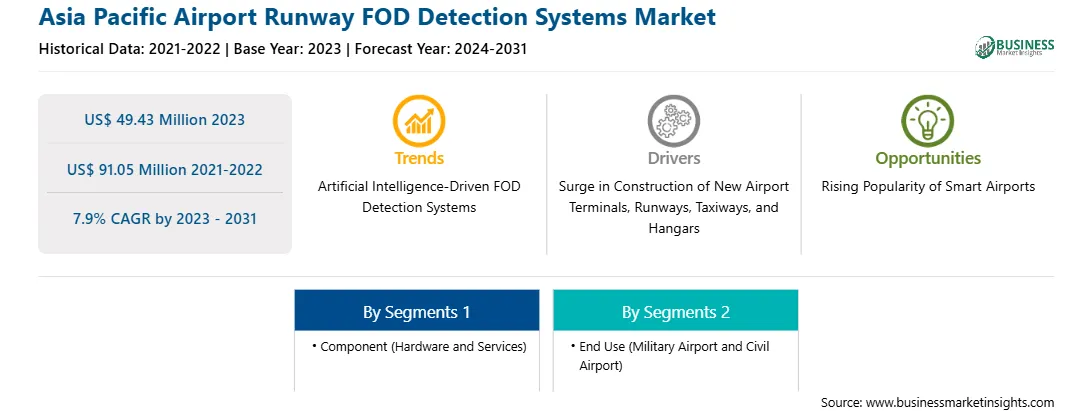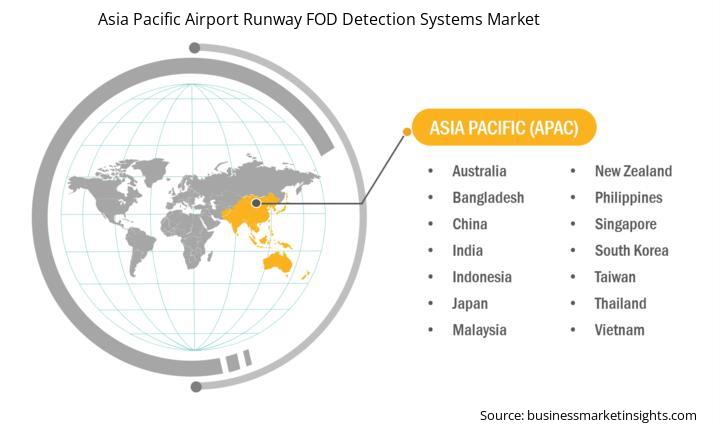The Asia Pacific airport runway FOD detection systems market was valued at US$ 49.43 million in 2023 and is expected to reach US$ 91.05 million by 2031; it is estimated to register a CAGR of 7.9% from 2023 to 2031.
Rising Popularity of Smart Airports Boosts Asia Pacific Airport Runway FOD Detection Systems Market
The increasing inclination of government authorities toward smart airports boosts the demand for the implementation of smart systems on airport premises. Governments of developed countries such as the US, the UK, and China are capitalizing on smart airport technologies, including communication and network systems, smart sensors, cameras, RFID tags, and wearables, owing to increasing preference for real-time information and mounting demand for advanced connectivity technologies in airport operations. For instance, in 2017, the Civil Aviation Authority of Singapore (CAAS) and NATS Limited implemented the smart digital tower in Changi Airport, which continues to enhance surveillance and communication capabilities.
The development of new airports and expansion of existing airports in countries such as the UK, the UAE, India, and Hong Kong is also growing. In August 2020, Gammon Construction Limited, a construction and engineering contractor based in Hong Kong, was awarded a four-year contract amounting to US$ 1.7 billion by the Hong Kong Airport to expand Terminal 2 at Chek Lap Kok Airport. Similarly, KL International Airport (KLIA) constantly focused on advancing its runway safety with the second phase of the trial for the high-precision Foreign Object Debris Detection System (FODDS) in 2021. The first phase was initiated in 2019 with two towers, followed by the complete installation of the remaining nine towers with the same high-precision radars. The installation of the new system is a multilateral collaboration between Hitachi Kokusai Electric Co., Ltd. (HiKE); Malaysia Airports; and Universiti Teknologi Malaysia (UTM).
The Singapore Changi Airport has integrated advanced technologies such as data analytics, sensors, and artificial intelligence to improve the customer experience while enhancing operational efficiency. Thus, the growing focus on smart airports is anticipated to create lucrative opportunities for the growth of the airport runway FOD detection systems market during the forecast period.
Asia Pacific Airport Runway FOD Detection Systems Market Overview
The aviation industry plays an important role in facilitating global connectivity and economic development. The demand for efficient and modern airport facilities has been on the rise across the globe. Asia Pacific accounted for the largest airport runway FOD detection systems market share in 2023, owing to a rise in investment toward the expansion and modernization of airport facilities in the region. In addition, Asia Pacific stands as a dynamic hub for airport infrastructure development, driven by the region's robust economic growth and a surge in air travel. The governments of China and India are involved in massive investments in new airport construction and expansion projects. In addition, China is deploying runway FOD detection systems at their runways to improve the safety of both passengers and airlines. Beijing Daxing International Airport and Beijing Capital International Airport have already deployed FOD detection systems to enhance runway safety by monitoring and detecting debris continuously. These initiatives aim to maintain passenger safety, which is expected to support the market growth in the coming years.
Asia Pacific Airport Runway FOD Detection Systems Market Revenue and Forecast to 2031 (US$ Million)
Strategic insights for the Asia Pacific Airport Runway FOD Detection Systems provides data-driven analysis of the industry landscape, including current trends, key players, and regional nuances. These insights offer actionable recommendations, enabling readers to differentiate themselves from competitors by identifying untapped segments or developing unique value propositions. Leveraging data analytics, these insights help industry players anticipate the market shifts, whether investors, manufacturers, or other stakeholders. A future-oriented perspective is essential, helping stakeholders anticipate market shifts and position themselves for long-term success in this dynamic region. Ultimately, effective strategic insights empower readers to make informed decisions that drive profitability and achieve their business objectives within the market. The geographic scope of the Asia Pacific Airport Runway FOD Detection Systems refers to the specific areas in which a business operates and competes. Understanding local distinctions, such as diverse consumer preferences (e.g., demand for specific plug types or battery backup durations), varying economic conditions, and regulatory environments, is crucial for tailoring strategies to specific markets. Businesses can expand their reach by identifying underserved areas or adapting their offerings to meet local demands. A clear market focus allows for more effective resource allocation, targeted marketing campaigns, and better positioning against local competitors, ultimately driving growth in those targeted areas.Asia Pacific Airport Runway FOD Detection Systems Strategic Insights

Asia Pacific Airport Runway FOD Detection Systems Report Scope
Report Attribute
Details
Market size in 2023
US$ 49.43 Million
Market Size by 2031
US$ 91.05 Million
Global CAGR (2023 - 2031)
7.9%
Historical Data
2021-2022
Forecast period
2024-2031
Segments Covered
By Component
By End Use
Regions and Countries Covered
Asia Pacific
Market leaders and key company profiles
Asia Pacific Airport Runway FOD Detection Systems Regional Insights

Asia Pacific Airport Runway FOD Detection Systems Market Segmentation
The Asia Pacific airport runway FOD detection systems market is categorized into component, end use, and country.
Based on component, the Asia Pacific airport runway FOD detection systems market is bifurcated into hardware and services. The hardware segment held a larger Asia Pacific airport runway FOD detection systems market share in 2023.
In terms of end use, the Asia Pacific airport runway FOD detection systems market is categorized into military airport and civil airport. The civil airport segment held a larger Asia Pacific airport runway FOD detection systems market share in 2023.
By country, the Asia Pacific airport runway FOD detection systems market is segmented into Australia, China, Japan, India, South Korea, and the Rest of Asia Pacific. China dominated the Asia Pacific airport runway FOD detection systems market share in 2023.
Moog Inc; Rheinmetall AG; QinetiQ Group Plc; Thales SA; Varec, Inc.; Smiths Detection Group Ltd. (Smiths Group plc); Infologic Pte Ltd.; Skylarklabs, Inc.; and Hitachi Ltd are some of the leading companies operating in Asia Pacific airport runway FOD detection systems market.
The Asia Pacific Airport Runway FOD Detection Systems Market is valued at US$ 49.43 Million in 2023, it is projected to reach US$ 91.05 Million by 2031.
As per our report Asia Pacific Airport Runway FOD Detection Systems Market, the market size is valued at US$ 49.43 Million in 2023, projecting it to reach US$ 91.05 Million by 2031. This translates to a CAGR of approximately 7.9% during the forecast period.
The Asia Pacific Airport Runway FOD Detection Systems Market report typically cover these key segments-
The historic period, base year, and forecast period can vary slightly depending on the specific market research report. However, for the Asia Pacific Airport Runway FOD Detection Systems Market report:
The Asia Pacific Airport Runway FOD Detection Systems Market is populated by several key players, each contributing to its growth and innovation. Some of the major players include:
The Asia Pacific Airport Runway FOD Detection Systems Market report is valuable for diverse stakeholders, including:
Essentially, anyone involved in or considering involvement in the Asia Pacific Airport Runway FOD Detection Systems Market value chain can benefit from the information contained in a comprehensive market report.